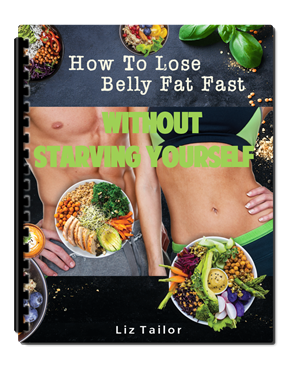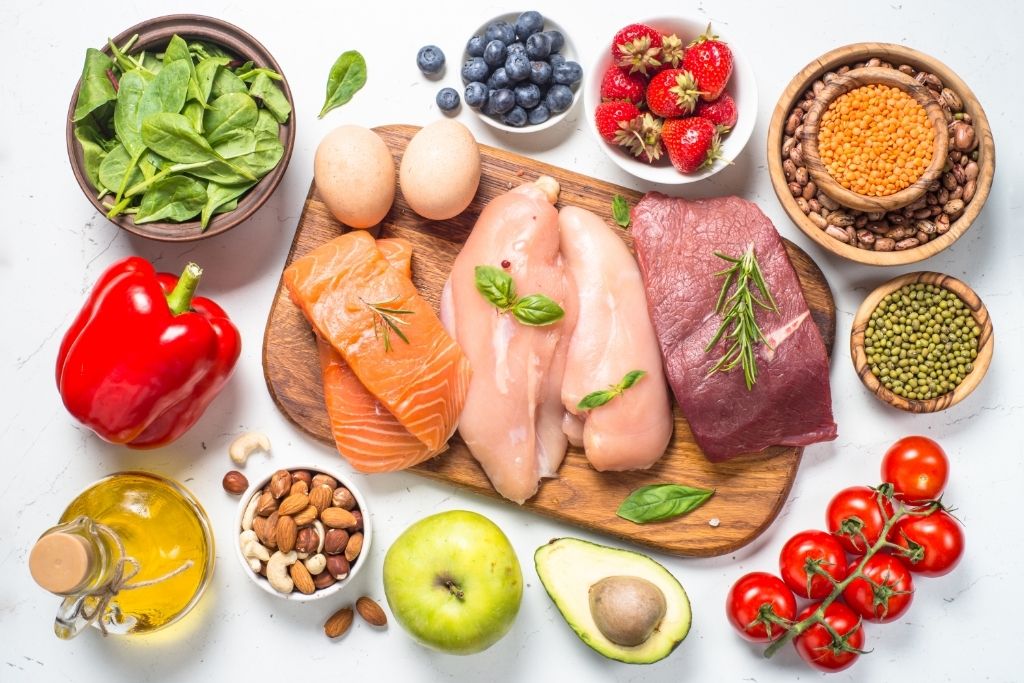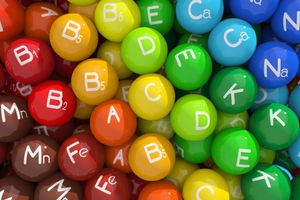Do you consistently eat a healthy balanced diet? The answer is probably no. It’s a known fact that most people don’t get their daily allowance of vitamins, minerals, and amino acids.
It’s not the end of the world if you have a few bad diet days where you don’t fulfill your daily nutritional requirements, because you don’t have to be perfect.
If you’re consistently consuming a well-balanced diet, you’ll most likely make up for your deficits later in the week.
It’s when you go for prolonged periods of time with a nutrition deficit that makes you susceptible to potential health issues.
For example, if you never get enough vitamin B, you may start experiencing some significant health problems later down the road.
Yet if on a weekly basis you do get enough vitamin B, then your system will balance out.
It’s important to know that many nutrients, not all, are stored in your body for a duration of time. And your body does make some vitamins, like vitamin D.
Balanced nutrition simply means providing your body with the macro and micronutrients that it needs to remain healthy.
It can be extremely difficult to maintain a healthy diet on a consistent basis, especially with our over-scheduled lifestyles.
No matter how jam-packed your daily To-Do List is, it’s your responsibility to take care of yourself, especially if you’re able to.
Since life is not a practice run, you must put in the effort to do your very best to consume a balanced diet.
Today, you’re not only going to discover some of the benefits of good nutrition, I will also provide tips for better meal planning, insights into symptoms caused by nutrient deficiencies, and so on.
Let’s get started…
Builds a Stronger Immune System
When you consume a balanced diet, your body gets what it needs to function optimally.
That means that it can focus energy on your immune system. When foreign invaders like bacteria and viruses enter your body, and this happens on a daily basis, your immune system kicks into action and isolates and kills the invaders.
If you fail to eat healthily, your body has to compensate for that lack of nutrients. When it has to compensate, it’s weaker.
When your body’s immune system is weak, it becomes susceptible to diseases.
More Energy
You need a number of nutrients in your body for your metabolism to function well. Your metabolism is a complicated system of hormones, enzymes, and chemical reactions.
It needs specific vitamins and minerals to manage different levels of the process.
For example, your thyroid is a gland that releases hormones that impact your metabolism.
When this hormone is low, your metabolism slows down. You feel lethargic, you get sick more often, and you gain weight.
Vitamins D, B, and C are important for healthy thyroid function, as are many other minerals, including selenium.
Longer Life
Because your cells and systems require essential nutrients, when you fuel your body with these nutrients, it has what it needs to thrive.
It’s not compromised. It’s not weakened. It’s able to function optimally.
When you’re compromised and your body has to work extra hard, that’s when disease happens, which can ultimately shorten your life span.
As you can see, complete nutrition is essential for optimal health. So why not take a supplement?
Why rely on food when a pill can help you give your body the vitamins and minerals that it needs?
Why Not Just Take a Pill?
People take supplements for a variety of reasons. Common logic for some is that they eat healthily, but they take a multivitamin for insurance.
It’s a just-in-case option - a Plan B, so to speak. The other reason that people take supplements or a multivitamin is that they believe that they’re staving off disease.
Many advertisements for supplements will tell you that taking a multivitamin will help prevent heart disease.
There are vitamins for men and sexual health, for women and memory loss, and for teenagers too. There are even gummy candy-like multivitamins to make them more fun to take.
There’s an ongoing debate about whether or not multivitamin and mineral supplements actually do what the manufacturers claim.
There are some studies that claim both multivitamins and mineral supplements did not work any better than placebo pills.
Some doctors have even stopped recommending that their patients take multivitamins.
If you plan on taking supplements, I recommend that you look for the best supplement companies that have been around for decades use the strictest manufacturing practices, and have thousands of raving customers that leave 4 and 5-star reviews.
Otherwise, you may end up purchasing low-quality supplements, which could become nothing more than expensive urine.
What Nutrients Do You Need?
If you’re striving for a balanced diet and you’re looking to get it from food, it can be helpful to know what vitamins and minerals most people fall short on.
These are generally nutrients that can be difficult to get from a standard diet.
Calcium
The daily recommendation for calcium is 1,000 milligrams a day. Calcium as you may know is good for bone health. It’s also an important part of the digestive process and other metabolic functions.
Calcium is essential for creating energy from your food. And many people just don’t get the calcium they need on a daily basis.
It’s such a problem that many physicians consider it to be just short of an epidemic.
According to the American Academy of Orthopedic Surgeons, “In the United States alone, 10 million people have osteoporosis, and 18 million more are at risk of developing the disease.
Another 34 million Americans are at risk of osteopenia, or low bone mass, which can lead to fractures and other complications.
You can find calcium in dairy products of course. But if you cannot have dairy products due to being lactose intolerant, then consider looking at fortified dairy alternatives, dark leafy greens, and fish with bones like sardines.
Potassium
Potassium is another mineral that is often difficult to obtain. On a daily basis, you need around 4,700 milligrams a day.
The average banana has 422 mg of potassium. Potassium helps regulate your blood pressure.
It may also decrease bone loss, reduce your risk of bone loss, and help with your cardiovascular health. It’s also part of the energy creation process.
Foods that are high in potassium include potatoes, tomatoes, beans (including soybeans), Swiss chard, dates, avocado, fish, and raisins.
It’s important to know that Swiss chard and avocados have almost 1000 mg of potassium per serving.
Bananas, while delicious, aren’t the potassium powerhouse that many believe them to be. They’re great, but if you really want a good bang for your buck, throw in some avocados.
Magnesium
There are a few minerals that are essential to good health and magnesium is one. It’s also one that is a little difficult to obtain without a conscious effort. The daily recommendation is 320 milligrams a day.
Magnesium helps with muscle and nerve function, and like many minerals, it helps sustain strong bones and bone density.
It’s found in seeds, nuts, fish, dark leafy greens, beans, and avocados. One serving or cup of spinach will give you 157 milligrams of magnesium, almost half of the daily recommendation.
Vitamin E
You’re supposed to get 15 milligrams of Vitamin E each day. It doesn’t sound like much, but unless you eat nuts or fortified cereals, you may have a difficult time getting enough vitamin E.
It is a vitamin that supports eye health, and skin health, and is also an antioxidant.
Other common nutrients that people tend to be deficient in include vitamins A and C, as well as fiber.
However, the truth is that if you get your daily serving of fruits and veggies and you have a few whole grains, you’ll get your daily supply of these important nutrients.
So the trick is to make sure that you integrate these nutrient-rich foods into your diet.
That’s best accomplished with a little meal planning. Meal planning is exactly what it sounds like.
You create a plan for what you’re going to eat during the week, including your meals and snacks.
Let’s take a look at some tips for better meal planning…
Tips for Better Meal Planning
Meal planning becomes an important part of achieving optimal or complete nutrition.
If you don't have a plan for what you're going to eat, you may end up grabbing whatever is fastest and most readily available.
This often means you're consuming processed food or junk food.
It’s a missed opportunity to get at least some nutrients into your system.
Junk food often causes more harm than good.
What Is Meal Planning?
Meal planning is simply deciding in advance what you’re going to have to eat in order to achieve the goal of balanced nutrition.
In most cases, people plan in advance several days’ worth of meals and snacks.
It makes shopping, cooking and preparing food, and eating, a much simpler and healthier process.
Here are 9 steps to make meal planning fun and easy:
1)) Decide How Often You Can Shop
If you can only shop once a week then you’re going to want to plan an entire week's worth of meals.
If you can shop every three or four days then you only have to plan those meals.
Alternatively, you can have your groceries delivered right to your doorstep.
2)) Plan For Snacks Too
Include snacks in your meal planning. It's too easy to grab something unhealthy when you don’t have a plan, especially when you’re on a busy schedule.
3)) Make It Tasty
Sure, you can plan to have carrots and celery sticks for a snack. However, if you don't like carrots and celery sticks, there's a bigger risk of you letting that snack get moldy in the fridge while you go out for some fries.
Make sure the recipes and foods you put into your meal plan are actually foods that you want to eat.
4)) Identify Recipe Sources
Where are you going to find your meal ideas? Identify a handful of great sources of nutritious recipes.
For example, you might begin to subscribe to a few nutritious eating blogs, or you might buy a few cookbooks.
5)) Create a System
Create systems to organize and plan. For example, maybe you hit the supermarket on Wednesday and Sunday.
Sit down at your table and make a full meal plan before you shop.
Add ingredients from each recipe to your shopping list so you go to the store knowing exactly what you need to buy.
Tip: Use one of the many mobile apps to help you organize your grocery list to make managing it easier.
6)) Get Those in Your Household Involved
If you're cooking for a family, get them involved in the meal planning process, and maybe even the preparation!
When people feel that they have a say in what is served, they tend to be more excited about it.
You might, for example, let a child choose one meal per week. They can also help prepare that meal.
The biggest benefit to getting the people that you live with involved means you’ll have less work to do, which can make the whole process more fun and enjoyable.
7)) Have Contingency Plans
It always makes sense to have some backup food. You might not have the leftovers that you expected from last night’s dinner and now you have nothing for lunch.
If you have some healthy backup foods, then you’re ready to go.
8)) Make-Ahead Recipes
If you live a super busy lifestyle (and who doesn't), then consider a few make-ahead recipes.
These are healthy recipes that you can prepare on the weekend, freeze, thaw, and heat for lunch or dinner.
Casseroles are great for this. Crockpot recipes are also wonderful. You can put everything together in the morning and come home to dinner.
9)) Try Something New
It's easy to get into a meal-planning rut. Meatless Monday, taco Tuesday, noodles on Wednesday, and so on.
While that does provide a framework to make planning easier, it can also start to feel limiting. Try to include one new recipe each week. It's good to feel excited about your food.
Meal planning can take some getting used to. It requires you to create a few new lifestyle habits.
However, once you've integrated these habits into your routine, you'll wonder how you ever managed without them. It’s a great way to make sure that each meal is nutritious and delicious.
One of the nutrients that many people tend to be deficient in, especially those with special diets like vegetarian, are the B vitamins.
Next, we'll take a look at foods that are high in B vitamins so you can make sure to include some of these foods in your meal planning.
Foods High in B Vitamins
Did you know that there are eight B vitamins? They often work together but each one has a few specific jobs.
For example, thiamin or B1 is necessary to make energy for your cells from the food that you eat.
It’s also an important part of making DNA and RNA. You really cannot do without this vitamin.
So let's take a look at each of the eight and provide a short description of what it does and what foods provide that specific B vitamin.
Thiamin
You can find this B vitamin in beans and lentils. You can also find it in many meat products, including red meat and pork.
Vegetarians will be happy to know that it’s in many nuts and seeds as well as spinach, cauliflower, and cruciferous vegetables.
Niacin
B3 is also an important part of creating energy for the cells. In addition, it synthesizes fatty acids and is important for your cardiovascular health.
You can find niacin in fish, beef, chicken, peanuts, beans, lentils, and whole grains.
Riboflavin
Very important for children and their development, B2 is required for energy production, growth, and controlling free radicals in the body.
Salmon, beef, eggs, and green leafy and cruciferous veggies contain riboflavin. Also known as vitamin B2, riboflavin is a basic building block for normal growth and development.
Vitamin B5
B5 aka pantothenic acid supports your body to produce energy. It’s found in lots of different sources, including both meat and vegetables. Avocados, organ meats, nuts, and seeds, are all great sources of B5.
Vitamin B6
This is a vitamin that your body simply cannot do without. It’s essential for just about every cellular function in your body, including your hormones, your nervous system, and your metabolism.
If you eat meat, you won’t have a problem getting this nutrient. Don’t eat meat and you’ll have to look for fortified foods and dark leafy greens for B6.
Vitamin B7
B7 is also known as biotin. It’s found in yeast, dairy products, and strawberries. It’s important for hair, skin, and nail health, as well as metabolism.
Folic Acid
Folic acid, or B9, is needed for the formation of red blood cells. It’s important in the development of fetuses, and you can find it in fortified foods and dark leafy greens.
Vitamin B12
This vitamin helps produce cellular energy and DNA synthesis as well as the formation of your red blood cells.
You can find it in animal products almost exclusively, including milk and eggs. If you’re a vegetarian or a vegan, look for fortified foods to get your B12.
B vitamins are important for optimal health and there are many B vitamins that you just cannot live without.
Also, there are minerals that are essential for survival. We’ll explore those next and talk about how you can embrace mineral-rich foods into your daily diet.
Tips to Consume More Foods That Are High in Minerals
When you think about complete health and a well-rounded diet, you probably think about vitamins first.
After all, we often hear words like antioxidants, plant sterols, and phytochemicals before we hear words like electrolytes and minerals.
Yet minerals are just as essential to your health and vitality as vitamins.
What Do Minerals Do?
Minerals actually play a very large role in a number of metabolic processes. At the cellular level, they are an integral part of the energy production process.
Your body cannot make energy from your food without minerals.
Minerals are also required for carrying nutrients to your body, as well as the hydration and elimination process.
You probably already know that minerals are required for bone health, but did you know that minerals impact your hormones and your immune system too?
The bottom line is that minerals are equally important to your health and this is often overlooked.
Let’s list the most important minerals first and then talk about adding them to your diet. The top three were mentioned earlier.
- Calcium
- Magnesium
- Potassium
- Phosphorus
- Selenium
- Copper
- Iron
- Boron
- Zinc
- Iodide
Getting Minerals into Your Diet
1)) Dairy or Fortified Dairy Alternatives
We’ve already discussed how dairy provides calcium for a healthy diet. If you cannot have dairy products, try dairy alternatives that have been fortified with calcium.
They may also have some additional mineral fortification.
2)) Dark Leafy Greens
Dark leafy greens are one of the most powerful superfoods that you can add to your daily diet.
This includes kale, spinach, and collards. Add them to smoothies, enjoy salads, and can also sauté and even bake some greens. They’re packed with vitamins and minerals.
3)) Bone Broth
Bone broth has become all the rage and if it hasn’t hit your community yet, just wait. Bone broth is made from boiling bones for long periods of time, up to 12 hours.
It releases minerals and an abundance of flavor. You can make soup from it or drink it as is. It’s super healthy and a great source of minerals.
Finally, don’t forget that sea salt, kelp, and fortified cereals can also provide an abundance of minerals.
While you don’t need a large number of minerals on a daily basis, it is important to make sure that you’re eating foods that give you the mineral nutrition that your body needs.
We’ve talked about minerals and a few vitamins specifically. Now let’s take a look at a broader category, antioxidants, and talk about what they are, why they’re important, and how to make sure you’re getting them into your diet.
Foods High in Antioxidants
You’ve probably heard the term, “antioxidants.”And you may know that they’re good for you and that you can find them in food.
You can also find them in beauty products, vitamins, and nutritional products.
What you may not know is exactly what they are, and what they do for you and your body.
What Are Antioxidants?
In technical terms, an antioxidant is a substance that inhibits or stops the oxidation of other molecules.
Okay, great - right? What’s oxidation and why does that matter? Well, when something is oxidized it loses electrons.
It’s now called a free radical which means that it can, and wants to, bind with something.
There’s room. And it can wreak havoc and cause damage to your tissues.
These radicals can start chain reactions. These oxidized elements actually steal electrons from other molecules, which damages them.
Now your body can handle some free radicals. It’s used to it and it’s generally prepared to deal with them.
However, our lifestyle has changed enough that we now tend to have many more of these little buggers running around in our bodies.
They’re caused by environmental problems like pollution, pesticides, and even exposure to cigarette smoke.
Antioxidants Neutralize Free Radicals
Antioxidants, as mentioned, negate the damage of free radicals. They protect your cells and help ensure you don’t suffer damage from free radicals.
So what damage can free radicals to cause?
Some of the problems include (but aren’t limited to)
- Arthritis
- Neural degeneration, which can lead to Alzheimer’s
- Premature aging
- Coronary heart disease
- Some cancers
Antioxidants are found in some specific foods. There are three major antioxidants that you want to include in your diet every day.
They are beta-carotene, vitamin C, and vitamin E.
You can find antioxidants in abundance in colorful veggies and fruits. Look for purple, red, blue, and orange produce.
You can also find them in interesting sources like coffee, tea, chocolate, onions, and garlic.
The good news is that essentially if you eat a diet that is generally prepared from whole foods rather than processed foods, you’re probably getting an abundance of antioxidants with every meal.
Focus on making sure that you’re getting enough fruits and vegetables and you’ll be well on your way to preventing excess damage caused by free radicals.
We’ve talked a lot about the nutrients that people generally consider to be healthy such as vitamins and minerals.
However, your body cannot even metabolize many vitamins and minerals without two other important nutrient categories.
We’re talking about protein and fat.
What about Protein and Fat?
Your body is protein. It’s in every cell and tissue. Enzymes are made from protein, as are your hormones and components of your blood.
Your hair, nails, and of course your muscles all are made from protein.
Protein isn’t stored in your body. You have to consume it and this is where many people get into trouble.
Vegetarians often don’t get enough protein, though many other people don’t either.
There’s a misconception that Americans often get too much protein.
The IOS has the following recommendation:
Adults need to get a minimum of 8 grams of protein for every 20 pounds of lean muscle mass.
So if you weigh 150 pounds, you’d want to get at least 60 grams each day. Athletes and active individuals may need more protein.
The challenge when you’re talking about complete health is to find sources of protein that come from foods that also provide other nutrients.
For example, salmon is a protein that comes with omega-3 fatty acids, lentils are packed with protein and an abundance of vitamins and minerals, and eggs come with minerals too.
When it comes to fat, it is true that your body needs fat. However, what it needs are fats from plants rather than fats from fatty cuts of meat.
Sure, you can have the occasional hamburger, but you may not want that to be the norm.
Studies have shown that food that’s high in saturated fat does cause heart disease and cardiovascular problems.
Strive to get your fats from plants. For example, avocados, nuts, and seeds are all high in fat, but it's fat that is good for you.
When you’re looking at your plate of food, the majority of it should be vegetables and plants.
However, you do want to have some room devoted to both fats (a small amount) and protein.
A balanced diet is the best way to get complete nutrition.
Simple Signs That Your Diet Is Missing Something
It can be difficult to know if you’re getting the nutrients that you need. This is one of the biggest reasons why people say that they take a multivitamin.
A good approach is to pay attention to your body.
Here are some signs that your diet is missing something:
1)) Low Energy
One of the surest signs that your diet is deficient in something is that you’re low on energy.
If you feel fatigued, it can be something as simple as not having enough minerals or vitamin B in your diet.
2)) Losing Your Hair/Cracking Nails
Dry and brittle nails and hair are often a sign of a nutrient deficiency. It could be that you’re low in protein or you could be low in biotin.
3)) Muscle Cramps
Muscle cramps are often a sign of mineral deficiencies. You may also be dehydrated.
4)) Skin Changes
If you notice rashes, acne, or small red bumps on your arms and legs, then it can be a sign of nutrient deficiency.
5)) Chronic Illness
If you find that you’re getting sick more often or generally feeling unwell, look to your diet.
Take some time to evaluate if you’re getting complete nutrition or if you might be lacking in specific nutrients.
Finally, your digestion can be a big clue about your nutritional well-being. Talk to your doctor if you have digestive and/or elimination issues.
It could be a direct reflection of your health and well-being and can be a significant clue about what is missing in your diet.
Conclusion
Awareness is the first step to improving your nutrition and leveraging food.
Become aware of what you’re putting into your body and how it makes you feel. What foods make you feel healthy and strong?
What foods improve your digestion? What improves your sleep and what foods make you feel lethargic or cause cravings?
You can begin by keeping a food journal. Start learning about the nutrients in your food choices.
What types of fat are you getting and are you eating enough protein? You might consider making a list of the daily recommended values for the major nutrients.
From there you could start placing checkmarks next to the nutrients you are getting from each meal.
Whether you measure and calculate and total your daily nutrients, or you simply keep an eye on whether you’re getting what you need, is up to you.
What’s most important is that you’re aware of what you should be getting and that if necessary, you’re taking steps to improve your nutrition by making smart food choices.
You should set nutrition goals and change your eating habits. For example, do you normally skip breakfast altogether, or just have a piece of toast?
If so, you’re missing an opportunity for nutrients. Change this habit and drink a smoothie or eat a piece of whole-grain toast with an avocado on it.
Take advantage of every snack and meal because they can be both delicious and nutritious.
Remember, the nutritional recommendations made are solid guidelines and not etched in stone, because everyone is different.
If you’d like to get the precise requirements tailored for your body, you’d have to consult a professional such as a nutritionist, fitness trainer, or doctor.
Now that you have a solid understanding of the Benefits Of Good Nutrition, there’s only one thing left to do, take action by changing your eating habits!
Download Our Free E-book!







